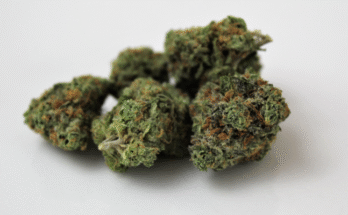A recent story did the rounds in the mainstream press claiming that CBD is a scam and potentially harmful.
As a CBD consumer for years, this shocked me.
However, as I looked into the report, it was clear that a lot of information was being left out and distorted.
That’s why I decided to look into the science behind CBD and clear up what its proven benefits actually are.
What is CBD?
CBD is a type of compound found in cannabis known as a cannabinoid.
While THC is the cannabinoid that induces the intoxicating effects, its counterpart cannabidiol (CBD) offers a different story.
CBD, devoid of the “high” associated with THC, still offers a host of medical benefits.
In fact, it has been shown in studies to have neuroprotective, anti-inflammatory, anti-bacterial, analgesic, and antiepileptic properties.
As it’s considered non-psychoactive, CBD is legal in the UK and is sold in a variety of over-the-counter consumer products, as well as registered medications.
How CBD works
The growing interest in CBD stems from its interaction with the endocannabinoid system, a crucial regulatory system in the human body, and its potential in treating conditions like epilepsy, chronic pain, anxiety, and inflammation.
THC primarily interacts with CB1 receptors, concentrated in the brain and spinal cord, influencing functions like appetite, stress, and memory processing.
In contrast, CBD primarily interacts with CB2 receptors, found in immune cells, reducing inflammation, a key factor in managing chronic diseases.

Proven benefits of CBD
This recently published review explored the existing literature to provide an up-to-date overview of the therapeutic potential of CBD.
Understanding the wide-ranging benefits of CBD doesn’t require a scientific background. Let’s break it down:
- Anxiety relief
CBD has shown to reduce anxiety in both animal and human studies, offering potential relief for conditions like panic disorder, PTSD, OCD, and general stress. It works by calming the mind without the intoxicating effects of THC.
- Antipsychotic properties
Unlike traditional antipsychotic medications, CBD has minimal side effects and does not rely on dopamine D2 antagonism. However, it has shown promise in reducing symptoms associated with conditions like schizophrenia and Parkinson’s disease.
- Epilepsy treatment
CBD has gained attention for its ability to reduce seizures, particularly in rare forms of epilepsy like Dravet Syndrome. Pharmaceutical-grade CBD has even received approval from regulatory bodies for certain epilepsy conditions.
- Chronic pain relief
Many chronic pain sufferers are turning to CBD as an alternative to opioids as it has minimal side effects. Studies have shown significant reductions in pain levels, along with improvements in sleep quality and overall quality of life.
In one notable study, in chronic pain patients with a history of opioid use, administering CBD extracts led to a significant reduction in opioid use for 53.2% of the participants. Remarkably, some patients completely stopped using opioids.
- Potential anticancer effects
While more research is needed, cannabinoids (including CBD) have shown promise in inhibiting cancer cell growth and promoting cell death. These findings offer hope for future cancer treatments.
- Diabetes
CBD offers a multifaceted approach to managing diabetes and its complications. Its ability to alleviate oxidative stress, protect heart cells, and modulate the immune system suggests it could be a valuable addition to diabetes treatment regimens.
- Cardiovascular health
CBD’s antioxidant and anti-inflammatory properties may benefit individuals with diabetic cardiomyopathy, reducing oxidative stress and protecting against heart dysfunction.
- COVID-19 potential
Early research suggests that CBD may play a role in reducing susceptibility to SARS-CoV-2 infection by regulating ACE2 expression and inhibiting viral entry.
- Neuroprotection
Studies have shown that CBD induces autophagy in nematodes, leading to anti-aging and neuroprotective effects Autophagy is the body’s way of cleaning out damaged cells in order to regenerate newer, healthier cells.
Other studies have shown that CBD may have a neuroprotective effect in stroke patients, suggesting cannabinoids could actually reduce the detrimental effects that come with suffering from a stroke.
Research also suggests that CBD restricts malondialdehyde (MDA) levels, one of the main causes of stress on the brain when suffering from a stroke.
- Inflammation
Studies suggests CBD could help lower pain and inflammation due to arthritis when applied to skin. Other research identifies how CBD may inhibit inflammatory and neuropathic pain, which are difficult treat.
- Addiction
CBD can help lower cravings for tobacco and heroin under certain conditions, according to some research in humans. Animal models of addiction suggest it may also help lessen cravings for alcohol, cannabis, opiates, and stimulants.

Is CBD safe?
CBD may cause side effects like nausea, fatigue, and irritability. It can also affect the levels of certain medications in your bloodstream by competing with liver enzymes. This is similar to how grapefruit interacts with some medicines.
High doses of CBD might lead to abnormal results in liver-related blood tests.
The main safety concern is that CBD is mainly sold as a supplement rather than a medication. Currently, dietary supplements aren’t strictly regulated. Therefore, you can’t be certain about the ingredients’ potency listed on the label.
Additionally, the product may contain undisclosed components.
Conclusion
CBD holds great promise. Its diverse therapeutic potential, coupled with its minimal side effects, offers an important option for treating various medical conditions.
While more studies are needed to fully understand its effects, the current research is promising and underscores CBD’s emerging role as a potential therapy.
Source: https://applbiolchem.springeropen.com/articles/10.1186/s13765-024-00867-w
🌿 Sign up to our weekly newsletter to keep up to date with the latest UK cannabis news, product reviews, and insider tips…




